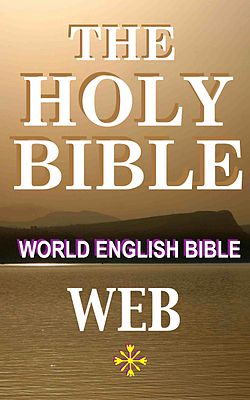World English Bible
| World English Bible | |
|---|---|
 |
|
| Full name | World English Bible |
| Abbreviation | WEB |
| Complete Bible published |
2000 |
| Online as | at |
| Authorship | Michael Paul Johnson (Editor in Chief) |
| Derived from | The American Standard Version 1901 |
| Textual basis | NT: Byzantine Majority Text by Robinson and Pierpont 1991. OT: Biblia Hebraica Stuttgartensia (with some Septuagint and Dead Sea Scrolls influence). |
| Translation type | Formal equivalence |
| Publisher | Rainbow Missions |
| Copyright | Public domain (copyright waived) |
| Website | http://www.ebible.org/ |
|
In the beginning God created the heavens and the earth. Now the earth was formless and empty. Darkness was on the surface of the deep. God's Spirit was hovering over the surface of the waters. God said, "Let there be light," and there was light.
For God so loved the world, that he gave his one and only Son, that whoever believes in him should not perish, but have eternal life.
|
|
The World English Bible (also known as the WEB) is a free updated revision of the American Standard Version (1901). It is one of the few public domain, modern-English translations of the entire Bible, and it is freely distributed to the public using electronic formats. The Bible was created by volunteers using the ASV as the base text as part of the ebible.org project through Rainbow Missions, Inc., a Colorado nonprofit corporation.
The World English Bible claims to be one of the few English-language Bibles custom translated to be understood by most English-speakers worldwide, eliminating the need for data-processing based or computer operating system-specific internationalizations. Work on the World English Bible began in 1997 and it was first known as the American Standard Version 1997.
The World English Bible project was started in order to produce a modern English Bible version that is not copyrighted, does not use archaic English (such as the KJV), and is not translated into Basic English (such as the Bible In Basic English). The World English Bible follows the American Standard Version's decision to transliterate the Tetragrammaton, but uses "Yahweh" instead of "Jehovah" throughout the Old Testament. The British and Messianic Names editions as well as the Apocryphal books and New Testament use the traditional forms (e.g., the LORD).
The translation also includes the following Apocryphal books (in the following order):
The work is based on the 1901 American Standard Version English translation, the Greek Majority Text, and the Hebrew Biblia Hebraica Stuttgartensia with some minor adjustments made because of alternate readings found in the Dead Sea Scrolls and the Septuagint. These alternate readings are usually ignored or restricted to the footnotes. The translation process included seven passes of editing and proofreading for each book. An initial automated pass updated approximately 1,000 archaic words, phrases and grammatical constructs. The first manual pass added quotation marks (the ASV had none) and other punctuation and compared the translation to the Greek and Hebrew texts in areas where significant textual variants or meanings were unclear.
...
Wikipedia
